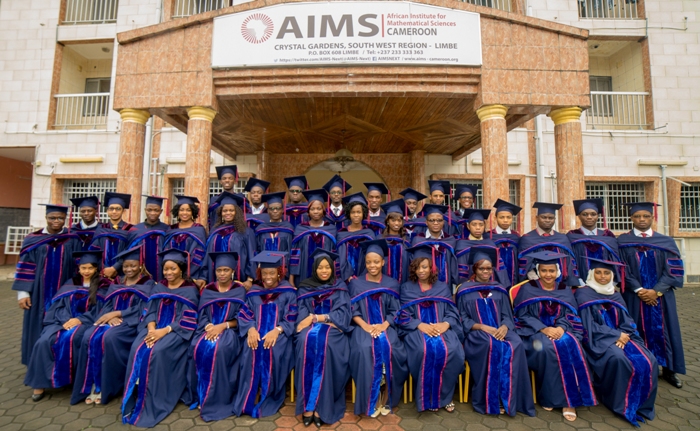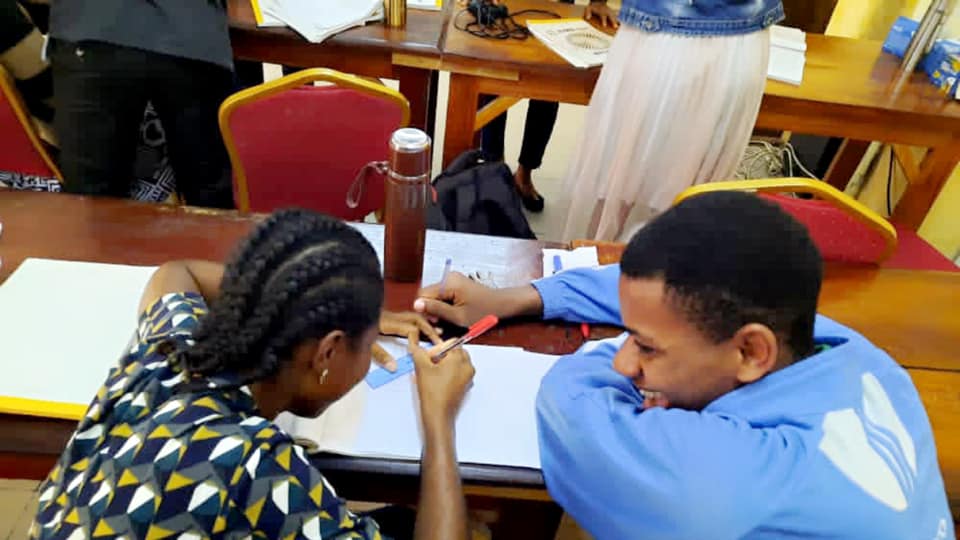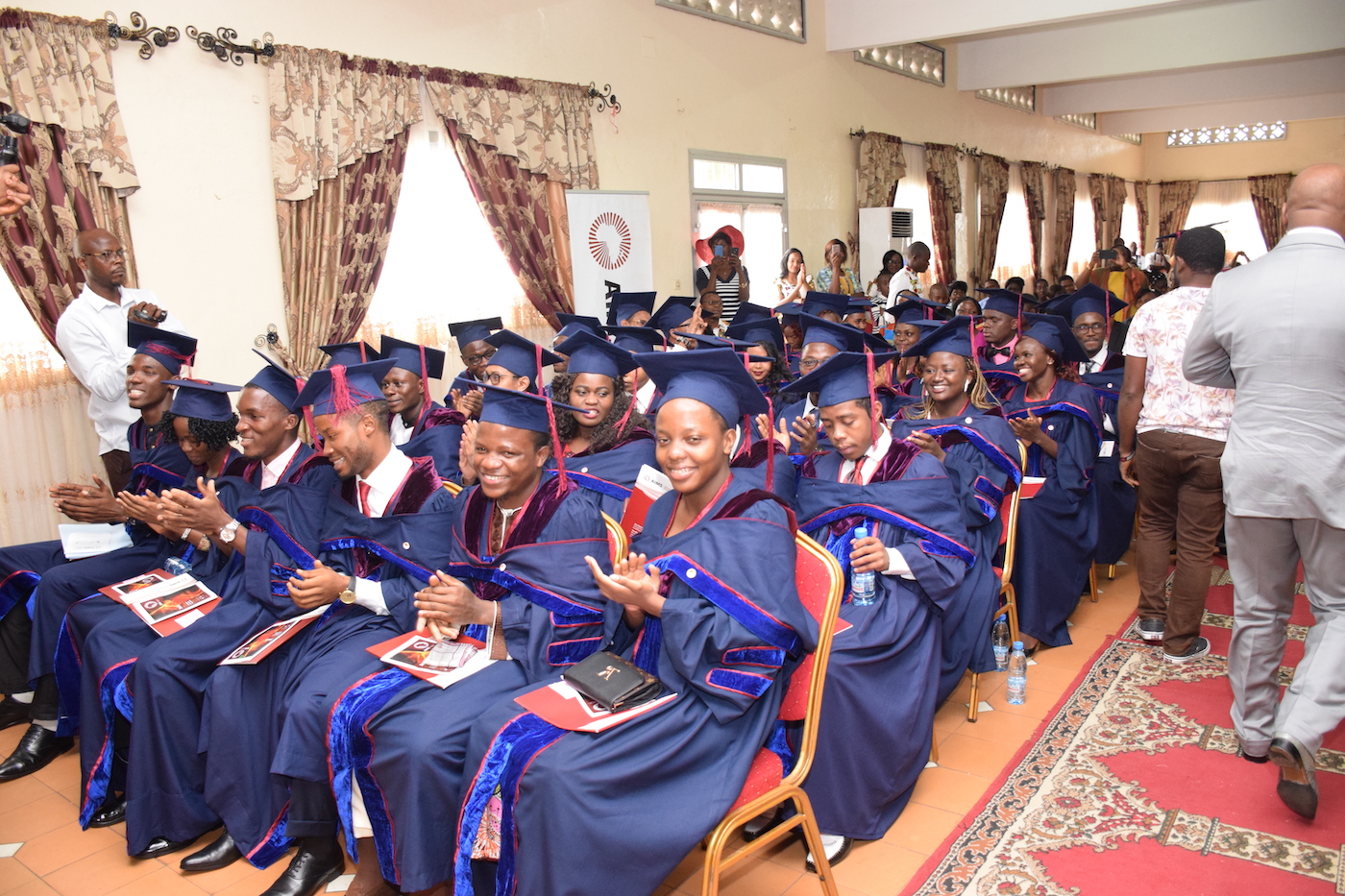
Structured Master’s Program
Overview
Each AIMS Centre offers an intensive one year graduate-level course leading to a Structured Master’s Degree in Mathematical Sciences. The course provides a broad overview of cutting-edge science and strong mathematical and computer research skills. The course is unique, offering students exposure to a range of topics, thereby allowing them to make informed choices as to their future specialisations.
The goal is to develop well-rounded scientists, with excellent problem-solving skills, capable of creative thinking and genuine innovation. There is a strong grounding in end-to-end skills, from problem formulation, estimation, prioritisation, and generally applicable mathematical and computing methods, to clear and concise scientific report writing. The aim is to equip students with the necessary tools and confidence for decision making and policy analysis.
Faculties from African universities have been intimately involved in developing the AIMS curriculum, ensuring it is integrated with local undergraduate and Master’s courses, and with local post-graduate research opportunities.
World-leading scientists and educators have volunteered to teach at AIMS centres. Their participation ensures an education of the highest international quality. Tutors (often including AIMS alumni) provide teaching and administrative support, assistance to foreign language speakers, and continuity across the visiting lecturers.

Prospective applicants
Completing a course of such scope and depth in just one academic year is possible only if it is highly intensive, so students must come prepared to work hard and focus. The residential nature of AIMS allows far greater contact time between lecturers and students than normally available in a university setting. Courses are student-centered but very demanding. Students study two subjects at a time every three weeks, with morning lectures and related afternoon problem solving and computing sessions. Each course consists of 30 hours contact time (10 per week). Additional tutorials and special lectures are often held in the evenings, when students complete their assignments.
No special preparation for the course is needed on a student’s part. The course also carries a large component of scientific computing, and many hours are spent in the computer lab; students who have improved their touch typing skills before the programme will have a distinct advantage.
The Curriculum
The Master’s Degree in the Mathematical Sciences is a one-year program commencing mid-August each year. The curriculum runs over 3 semesters described below. There is an oral defense of the research project in mid-June, and the year culminates in graduation at the end of June.
Skills courses are designed to provide introductory and foundational material to the students, and are structured to achieve pre-defined outcomes, with little flexibility in their content. All courses are compulsory.
Review courses are fundamentally different in that they include a wide range of topical issues and are more flexibly designed. Review courses will be taught from November through March.
Students are required to complete 2 out of the 3 available review courses in each time slot, a total of 12.
During the seven-week-long project/research phase students work on a research topic with a supervisor, usually from a local university. Students are not expected to do original work to achieve a passing grade. The criterion for an outstanding essay is broadly that it could constitute the early part of a Masters thesis. For example, it could be publishable in a journal, or form an outstanding introduction to the field that could be used by other students entering the area. During this phase targeted communication skills and computing classes may continue, at the lecturers’ discretion. The purpose of a masters research project is:
- to give students the opportunity to work with an expert supervisor on a non-trivial project;
- to go through the process of independently reviewing, understanding and explaining scientific or mathematical material;
- to optionally (usually) do experiments — on a computer or otherwise — and report the results;
- to write a scientific report.

Innovations Introduced in 2020
For the Academic Year 2020-21, the Selection Process was upgraded by conducting interviews (on WhatsApp, Zoom etc.) with all shortlisted students. Applicants were asked to summarise their bachelor or other dissertations, to explain their motivations for joining AIMS and their plans afterwards. Basic questions on topics listed in their transcripts (first or second year level) tested at the same time the background of the applicant and their suitability for the intensive training they would face at AIMS.
In order to broaden the scope of our one-year Master’s training in Mathematical Sciences, the students have been enrolled under three Streams including the Climate Science Stream, the Data Science Stream, and the Fundamental Science Stream. The overall goal is for all students at AIMS Cameroon to hone their skills in these domains, crystallize their knowledge in their AIMS research projects and beyond, increasing the critical mass of Mathematical Scientists contributing in different areas to Africa’s sustainable development.
The Climate Science Stream
In the face of a changing climate, and in line with AIMS’ growing response to climate change, AIMS Cameroon with the support of the International Development Research Centre (IDRC) and Global Affairs Canada (GAC) has, this year, enrolled twelve (12) students under the Climate Science stream. This stream offers courses in Climate Science to equip students with the tools to tackle climate change related issues through the use of Mathematical Sciences. The Climate Science stream has been funded by the AIMS-MS4CR program.
The Data Science Stream
Given the popularity and growing importance of Data Science in the improvement of governance, business functions and people’s quality of life, AIMS Cameroon has this year enrolled sixteen (16) students under this new interdisciplinary field. This stream offers courses in Data Science to increase the transition to meaningful employment for AIMS scholars by enriching their learning experience with the acquisition of competencies relevant to the industrial and public sector.
The Fundamental Science Stream
This stream offers academically oriented courses to students who intend to further their studies in the field of Mathematical Sciences. With ten (10) scholars enrolled under this stream, we are sure to achieve our mission to groom the next generation of faculty members at different universities in Cameroon and Africa and train excellent researchers and inspiring teachers.
